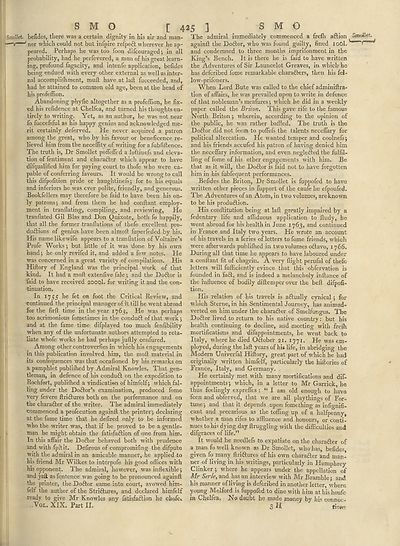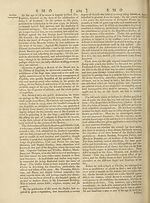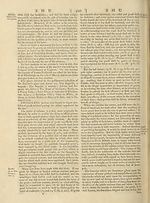Encyclopaedia Britannica, or, a Dictionary of arts, sciences, and miscellaneous literature : enlarged and improved. Illustrated with nearly six hundred engravings > Volume 19, Scripture-SUG
(471) Page 425
Download files
Complete book:
Individual page:
Thumbnail gallery: Grid view | List view

S M O [ 425 ] S M O
iSmollet. befides, there was a certain dignity in his air and raan-
ner which could not but infpire refpedt wherever he ap¬
peared. Perhaps he was too foon difcouraged; in all
probability, had he perfevered, a man of his great learn¬
ing, profound fagacity, and intenfe application, befidcs
being endued with every other external as well as inter¬
nal accomplilhment, mult have at laft fucceeded, and,
had he attained to common old age, been at the head of
his profeflion.
Abandoning phyfic altogether as a profeflion, he fix¬
ed his refidence at Chelfea, and turned his thoughts en¬
tirely to writing. Yet, as an author, he was not near
fo fuccefsful as his happy genius and acknowledged me¬
rit certainly deferved. Pie never acquired a patron
among the great, who by his favour or beneficence re¬
lieved him from the neceflity of writing for a fubfiftence.
The truth is, Dr Smollet poffefTed a loftinefs and eleva¬
tion of fentiment and character which appear to have
difqualified him for paying court to thofe who were ca¬
pable of conferring favours. It would be wrong to call
this difpofition pride or haughtinefsj for to his equals
and inferiors he was ever polite, friendly, and generous.
Bookfellers may therefore be faid to have been his on¬
ly patrons’, and from them he had conflant employ¬
ment in tranflating, compiling, and reviewing, He
tranflated Gil Bias and Don (Quixote, both fo happily,
that all the former tranfiations of thefe excellent pro-
duftions of genius have been almoft fuperfeded by his.
His namelikewife appears to a tranflation of Voltaire’s
Profe Works; but little of it was done by his own
hand 5 he only revifed it, and added a few notes. He
was concerned in a great variety of compilations. His
Hiftory of England was the principal work of that
kind. It had a moft extenfive fale •, and the Doctor is
Paid to have received 2000I. for writing it and the con¬
tinuation.
In 1755 he fet or foot the Critical Review, and
continued the principal manager of it till he went abroad
for the firft time in the year 1763, He was perhaps
too acrimonious fometimes in the condudl of that work 5
and at the fame time difplayed too much fenfibility
when any of the unfortunate authors attempted to reta¬
liate whofe works he had perhaps juftly cenfured.
Among other controverfies in which his engagements
in this publication involved him, the moft material in
its confequences was that occafioned by his remarks on
a pamphlet publifhed by Admiral Knowles. That gen¬
tleman, in defence of his conduct on the expedition to
Rochfort, publiftied a vindication of himfelf; which fal¬
ling under the Doctor’s examination, produced fome
very fevere ft natures both on the performance and on
the chara£ter of the writer. The admiral immediately
commenced a profecution againft the printer) declaring
at the fame time that he defired only to be informed
who the writer was, that if he proved to be a gentle¬
man he might obtain the fatisfaftion of one from him.
In this affair the Dofror behaved both with prudence
and with fpftit. Defirous of compromifing the difpute
with the admiral in an amicable manner, he applied to
his friend Mr Wilkes to interpofe his good offices wdth
his opponent. The admiral, however, was inflexible)
and juft as fentence was going to be pronounced againft
the printer, the Doctor came into court, avowed him-
felf the author of the Strictures, and declared himfelf
ready to give Mr Knowles any fatisfaCtion he chofe*
..Vol, XIX. Part II.
The admiral immediately commenced a frefh aCtion Smollet.
againft the DoCtor, who was found guilty, fined loOl. -V
and condemned to three months imprifonment in the
King’s Bench. It is there he is faid to have written
the Adventures of Sir Launcelot Greaves, in which' he
has defcribed fome remarkable characters, then his fel-
low-prifoners.
When Lord Bute was called to the chief adminiftra-
tion of affairs, he was prevailed upon to write in defence
of that nobleman’s meafures) which he did in a weekly
paper called the Briton. This gave rife to the famous
North Briton ) wherein, according to the opinion of
the public, he was rather baffled. The truth is the
DoCtor did not feem to poffefs the talents neceffary for
political altercation. He wanted temper and coolnefs)
and his friends accufed his patron of having denied him
the neceffary information, and even negleCted the fulfil¬
ling of fome of his other engagements with him. Be
that as it will, the DoCtor is faid not to have forgotten
him in his fubfequent performances.
Befides the Briton, Dr Smollet is fuppofed to have
written other pieces in fupport of the caufe he efpoufed.
The Adventures of an Atom, in two volumes, areknown
to be his production.
His conftitution being at laft greatly impaired by a
fedentary life and affiduous application to ftudy, he
went abroad for his health in June 1763, and continued
in France and Italy two years. He v'rote an account
of his travels in a feries of letters to fome friends, which
were afterwards publifhed in two volumes oCtavo, 1766.
During all that time he appears to have laboured under
a conftant fit of chagrin. A very flight perufal of thefc
letters will fufficiently evince that this obfervation is
founded in faCt, and is indeed a melancholy inftance of
the influence of bodily diftemperover the beft difpofx-
tion.
His relation of his travels is aClually cynical ; for
which Sterne, in his Sentimental Journey, has animad¬
verted on him under the chara&er of Smelfungus. The
DoCtor lived to return to his native country: but his
health continuing to decline, and meeting with frefh
mortifications and difappointments, he went back to
Italy, where he died October 21. 1771. He was em¬
ployed, during the laft years of his life, in abridging the
Modern Univerfal Hiftory, great part of which he had
originally written himfelf, particularly the hiftories of
France, Italy, and Germany.
He certainly met with many mortifications and dif¬
appointments) which, in a letter to Mr Garrick, he
thus feelingly expreffes : “ I am old enough to have
feen and obferved, that we are all playthings of For¬
tune) and that it depends upon fometliing as infignifi-
cant and precarious as the toffing up of a halfpenny,
whether a man rifes to affluence and honours, or conti¬
nues to his dy ing day ftruggling with the difficulties and
difgraces of life.”
It would be needlefs to expatiate on the charafter of
a man fo well known as Dr Smollet, who has, befides
given fo many ftriftures of his own character and man¬
ner of living in his writings, particularly in Humphrey
Clinker ) where he appears under the appellation of
Mr Ser/e, and has an interview with Mr Bramble; and
his manner of living is defcribed in another letter, where
young Melford is fuppofed to dine with him athishoufc
in Chelfea. No doubt he made money by his connec-
3 H tion*:
iSmollet. befides, there was a certain dignity in his air and raan-
ner which could not but infpire refpedt wherever he ap¬
peared. Perhaps he was too foon difcouraged; in all
probability, had he perfevered, a man of his great learn¬
ing, profound fagacity, and intenfe application, befidcs
being endued with every other external as well as inter¬
nal accomplilhment, mult have at laft fucceeded, and,
had he attained to common old age, been at the head of
his profeflion.
Abandoning phyfic altogether as a profeflion, he fix¬
ed his refidence at Chelfea, and turned his thoughts en¬
tirely to writing. Yet, as an author, he was not near
fo fuccefsful as his happy genius and acknowledged me¬
rit certainly deferved. Pie never acquired a patron
among the great, who by his favour or beneficence re¬
lieved him from the neceflity of writing for a fubfiftence.
The truth is, Dr Smollet poffefTed a loftinefs and eleva¬
tion of fentiment and character which appear to have
difqualified him for paying court to thofe who were ca¬
pable of conferring favours. It would be wrong to call
this difpofition pride or haughtinefsj for to his equals
and inferiors he was ever polite, friendly, and generous.
Bookfellers may therefore be faid to have been his on¬
ly patrons’, and from them he had conflant employ¬
ment in tranflating, compiling, and reviewing, He
tranflated Gil Bias and Don (Quixote, both fo happily,
that all the former tranfiations of thefe excellent pro-
duftions of genius have been almoft fuperfeded by his.
His namelikewife appears to a tranflation of Voltaire’s
Profe Works; but little of it was done by his own
hand 5 he only revifed it, and added a few notes. He
was concerned in a great variety of compilations. His
Hiftory of England was the principal work of that
kind. It had a moft extenfive fale •, and the Doctor is
Paid to have received 2000I. for writing it and the con¬
tinuation.
In 1755 he fet or foot the Critical Review, and
continued the principal manager of it till he went abroad
for the firft time in the year 1763, He was perhaps
too acrimonious fometimes in the condudl of that work 5
and at the fame time difplayed too much fenfibility
when any of the unfortunate authors attempted to reta¬
liate whofe works he had perhaps juftly cenfured.
Among other controverfies in which his engagements
in this publication involved him, the moft material in
its confequences was that occafioned by his remarks on
a pamphlet publifhed by Admiral Knowles. That gen¬
tleman, in defence of his conduct on the expedition to
Rochfort, publiftied a vindication of himfelf; which fal¬
ling under the Doctor’s examination, produced fome
very fevere ft natures both on the performance and on
the chara£ter of the writer. The admiral immediately
commenced a profecution againft the printer) declaring
at the fame time that he defired only to be informed
who the writer was, that if he proved to be a gentle¬
man he might obtain the fatisfaftion of one from him.
In this affair the Dofror behaved both with prudence
and with fpftit. Defirous of compromifing the difpute
with the admiral in an amicable manner, he applied to
his friend Mr Wilkes to interpofe his good offices wdth
his opponent. The admiral, however, was inflexible)
and juft as fentence was going to be pronounced againft
the printer, the Doctor came into court, avowed him-
felf the author of the Strictures, and declared himfelf
ready to give Mr Knowles any fatisfaCtion he chofe*
..Vol, XIX. Part II.
The admiral immediately commenced a frefh aCtion Smollet.
againft the DoCtor, who was found guilty, fined loOl. -V
and condemned to three months imprifonment in the
King’s Bench. It is there he is faid to have written
the Adventures of Sir Launcelot Greaves, in which' he
has defcribed fome remarkable characters, then his fel-
low-prifoners.
When Lord Bute was called to the chief adminiftra-
tion of affairs, he was prevailed upon to write in defence
of that nobleman’s meafures) which he did in a weekly
paper called the Briton. This gave rife to the famous
North Briton ) wherein, according to the opinion of
the public, he was rather baffled. The truth is the
DoCtor did not feem to poffefs the talents neceffary for
political altercation. He wanted temper and coolnefs)
and his friends accufed his patron of having denied him
the neceffary information, and even negleCted the fulfil¬
ling of fome of his other engagements with him. Be
that as it will, the DoCtor is faid not to have forgotten
him in his fubfequent performances.
Befides the Briton, Dr Smollet is fuppofed to have
written other pieces in fupport of the caufe he efpoufed.
The Adventures of an Atom, in two volumes, areknown
to be his production.
His conftitution being at laft greatly impaired by a
fedentary life and affiduous application to ftudy, he
went abroad for his health in June 1763, and continued
in France and Italy two years. He v'rote an account
of his travels in a feries of letters to fome friends, which
were afterwards publifhed in two volumes oCtavo, 1766.
During all that time he appears to have laboured under
a conftant fit of chagrin. A very flight perufal of thefc
letters will fufficiently evince that this obfervation is
founded in faCt, and is indeed a melancholy inftance of
the influence of bodily diftemperover the beft difpofx-
tion.
His relation of his travels is aClually cynical ; for
which Sterne, in his Sentimental Journey, has animad¬
verted on him under the chara&er of Smelfungus. The
DoCtor lived to return to his native country: but his
health continuing to decline, and meeting with frefh
mortifications and difappointments, he went back to
Italy, where he died October 21. 1771. He was em¬
ployed, during the laft years of his life, in abridging the
Modern Univerfal Hiftory, great part of which he had
originally written himfelf, particularly the hiftories of
France, Italy, and Germany.
He certainly met with many mortifications and dif¬
appointments) which, in a letter to Mr Garrick, he
thus feelingly expreffes : “ I am old enough to have
feen and obferved, that we are all playthings of For¬
tune) and that it depends upon fometliing as infignifi-
cant and precarious as the toffing up of a halfpenny,
whether a man rifes to affluence and honours, or conti¬
nues to his dy ing day ftruggling with the difficulties and
difgraces of life.”
It would be needlefs to expatiate on the charafter of
a man fo well known as Dr Smollet, who has, befides
given fo many ftriftures of his own character and man¬
ner of living in his writings, particularly in Humphrey
Clinker ) where he appears under the appellation of
Mr Ser/e, and has an interview with Mr Bramble; and
his manner of living is defcribed in another letter, where
young Melford is fuppofed to dine with him athishoufc
in Chelfea. No doubt he made money by his connec-
3 H tion*:
Set display mode to:
![]() Universal Viewer |
Universal Viewer | ![]() Mirador |
Large image | Transcription
Mirador |
Large image | Transcription
Images and transcriptions on this page, including medium image downloads, may be used under the Creative Commons Attribution 4.0 International Licence unless otherwise stated. ![]()
| Permanent URL | https://digital.nls.uk/192701405 |
|---|
| Attribution and copyright: |
|
|---|
| Description | Ten editions of 'Encyclopaedia Britannica', issued from 1768-1903, in 231 volumes. Originally issued in 100 weekly parts (3 volumes) between 1768 and 1771 by publishers: Colin Macfarquhar and Andrew Bell (Edinburgh); editor: William Smellie: engraver: Andrew Bell. Expanded editions in the 19th century featured more volumes and contributions from leading experts in their fields. Managed and published in Edinburgh up to the 9th edition (25 volumes, from 1875-1889); the 10th edition (1902-1903) re-issued the 9th edition, with 11 supplementary volumes. |
|---|---|
| Additional NLS resources: |
|

